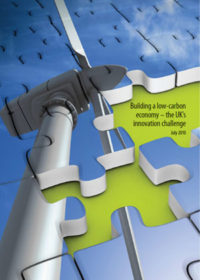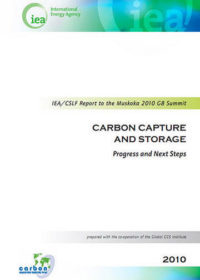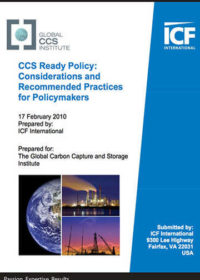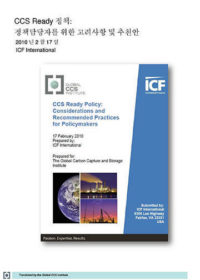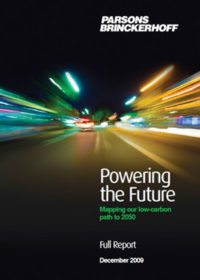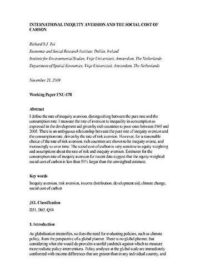Resources
Publications
Our publications, reports and research library hosts over 500 specialist reports and research papers on all topics associated with CCS.
View our Publication Library Disclaimer.
Filter by
Building a low carbon economy: the UK’s innovation challenge
19th July 2010
Topic(s): Carbon capture use and storage (CCUS), Economics, Energy efficiency, Marine energy, Nuclear fission, Offshore wind, Policy law and regulation, Renewables, Wind energy
This report considers the effectiveness of current policy measures and institutional arrangements to deliver the technologies required to meet the UK’s 2050 emissions target.
Disclaimer
The content within the Global CCS Institute Publications, Reports and Research Library is provided for information purposes only. We make every effort and take reasonable care to keep the content of this section up-to-date and error-free. However, we make no claim as to its accuracy, currency or reliability.
Content and material featured within this section of our website includes reports and research published by third parties. The content and material may include opinions and recommendations of third parties that do not reflect those held by the Global CCS Institute.
1996 Protocol to the London Convention 1972: Overview of contracting states
7th July 2010
Topic(s): Policy law and regulation
1996 Protocol to the London Convention 1972: Overview of contracting states
Disclaimer
The content within the Global CCS Institute Publications, Reports and Research Library is provided for information purposes only. We make every effort and take reasonable care to keep the content of this section up-to-date and error-free. However, we make no claim as to its accuracy, currency or reliability.
Content and material featured within this section of our website includes reports and research published by third parties. The content and material may include opinions and recommendations of third parties that do not reflect those held by the Global CCS Institute.
IEA/CSLF report to the Muskoka 2010 G8 Summit. Carbon capture and storage: progress and next steps
14th June 2010
Topic(s): Carbon capture use and storage (CCUS), Policy law and regulation
Two years after the G8 leaders commitment to the broad deployment of carbon capture and storage (CCS) by 2020, significant progress has been made towards commercialisation of CCS technologies. Yet the 2008 Hokkaido G8 recommendation to launch 20 large-scale CCS demonstration projects by 2010 remains a challenge and will require that governments and industry accelerate the pace toward achieving this critical goal. This is one of the main findings of a new report by the International Energy Agency (IEA), the Carbon Sequestration Leadership Forum (CSLF), and the Global CCS Institute, to be presented to G8 leaders at their June Summit in Muskoka, Canada.
Disclaimer
The content within the Global CCS Institute Publications, Reports and Research Library is provided for information purposes only. We make every effort and take reasonable care to keep the content of this section up-to-date and error-free. However, we make no claim as to its accuracy, currency or reliability.
Content and material featured within this section of our website includes reports and research published by third parties. The content and material may include opinions and recommendations of third parties that do not reflect those held by the Global CCS Institute.
Climate change, carbon sequestration, and property rights
23rd February 2010
Topic(s): Carbon capture use and storage (CCUS), Policy law and regulation
This technology, known as carbon capture and sequestration (CCS), could provide deep emission cuts, particularly from coal power generation, on a worldwide basis. In order to widely deploy this technology, future CCS operators must be able to access millions of acres of deep subsurface “pore space” roughly a kilometer below the earth’s surface to sequester the CO2 for hundreds to thousands of years. This Article explores questions relating to ownership of subsurface pore space, physical takings, regulatory takings, and just compensation that will necessarily accompany the implementation of CCS in the United States. In order to accommodate the full range of property rights and takings issues that will arise with CCS, this Article proposes a regulatory framework based in part on the Natural Gas Act to address these issues in connection with subsurface CO2 sequestration.
Disclaimer
The content within the Global CCS Institute Publications, Reports and Research Library is provided for information purposes only. We make every effort and take reasonable care to keep the content of this section up-to-date and error-free. However, we make no claim as to its accuracy, currency or reliability.
Content and material featured within this section of our website includes reports and research published by third parties. The content and material may include opinions and recommendations of third parties that do not reflect those held by the Global CCS Institute.
CCS ready policy: considerations and recommended practices for policymakers
17th February 2010
Topic(s): Carbon capture use and storage (CCUS), Policy law and regulation
This report provides guidance to policymakers on deciding whether a CCS Ready Policy is desirable and, if so, selecting different levels of requirements for capture, storage and transport based on jurisdictional characteristics and requirements.
They also provide detailed guidelines for policymakers in developing CCS Ready policy, and for regulators in implementing such a policy.
Disclaimer
The content within the Global CCS Institute Publications, Reports and Research Library is provided for information purposes only. We make every effort and take reasonable care to keep the content of this section up-to-date and error-free. However, we make no claim as to its accuracy, currency or reliability.
Content and material featured within this section of our website includes reports and research published by third parties. The content and material may include opinions and recommendations of third parties that do not reflect those held by the Global CCS Institute.
CCS Ready 정책: 정책담당자를 위한 고려사항 및 추천안
17th February 2010
Topic(s): Carbon capture use and storage (CCUS), Policy law and regulation
CCS Ready플랜트에 대한 명확한 정의는 정책 담당자들이 CCS Ready플랜트의 기본 요건을 개발하는 데 사용될 수 있다. 정책 담당자들을 돕기 위해 이 보고서 본문의 고려 사항 및 추천안에서 제안된 정의에는, CCS Ready 플랜트는 포집, 수송, 저장 각 단계에 대한 준비가 되어 있어야 한다는 개념이 반영되어 있다. 이 3 단계는 서로 밀접한 연관이 있으며, CCS의 성공적인 보급을 위해 반드시 필요하다.
이러한 정의에 근거하여 고려 사항 및 추천안은 CCS Ready 플랜트의 기타 요소(예 : 공장 설계, 장비 사전 투자, 저장부지 선정, 저장부지와 수송 통로 상충 이용 및 권리)를 선별했다. 각 요소에 해당하는 CCS Ready 플랜트에 대한 특정 요구 조건이 세 가지 단계로 제시되어 있다.
마지막으로, 고려 사항 및 추천안은 정책 담당자의 CCS Ready 정책이 바람직한 것인지 여부를 판단하고, 관할권의 특성과 요구 조건에 적합한 포집•저장•수송 준비 공장의 필요조건을 제시할 것이다. 또한 정책 담당자가 CCS Ready 정책을 개발하고, 입법 담당자가 해당 정책을 시행하는 과정에서 참고할 수 있는 상세한 지침을 제공한다.
Disclaimer
The content within the Global CCS Institute Publications, Reports and Research Library is provided for information purposes only. We make every effort and take reasonable care to keep the content of this section up-to-date and error-free. However, we make no claim as to its accuracy, currency or reliability.
Content and material featured within this section of our website includes reports and research published by third parties. The content and material may include opinions and recommendations of third parties that do not reflect those held by the Global CCS Institute.
Position paper on benchmarking and allocation rules in phase III of the EU Emissions Trading System
1st February 2010
Topic(s): Carbon markets, Policy law and regulation
Disclaimer
The content within the Global CCS Institute Publications, Reports and Research Library is provided for information purposes only. We make every effort and take reasonable care to keep the content of this section up-to-date and error-free. However, we make no claim as to its accuracy, currency or reliability.
Content and material featured within this section of our website includes reports and research published by third parties. The content and material may include opinions and recommendations of third parties that do not reflect those held by the Global CCS Institute.
Efficiency of policy choices for the deployment of large scale low carbon technologies: The case of carbon capture and sequestration
1st January 2010
Topic(s): Carbon capture use and storage (CCUS), Policy law and regulation
The focus of this report is on the specific barriers to learning investment during pre-commercial deployment of large scale and intertwined technologies. We first analyze the market failures inherent to the barriers to innovation that exist in the market, which justify support during the learning investment phase and the subsequent roll out of CCS capacity in electricity generation. Then we analyze and compare the efficiency of the different ways to help support CCS technologies to cross this so-called “death valley”: command and control instruments (CCS mandates, low carbon ratios on production), investment support under different designs (direct subsidy, tax credit, subsidy by trust fund) and production subsidies (guaranteed carbon price, feed-in price, amongst others). These instruments are compared and contrasted according to four criteria: effectiveness, static efficiency, dynamic efficiency and timing (adequacy to the technology development stage). We conclude that policy instruments must be adapted to the technological and commercial maturity of the CCS system at some point between the demonstration stage and the purely commercial deployment stage. In particular mandate policies must be handled with some care. With regards to subsidization mechanisms, their design must be market-oriented, this is particularly the case with auctioning, in order to limit information asymmetries between CCS investors and regulators.
Disclaimer
The content within the Global CCS Institute Publications, Reports and Research Library is provided for information purposes only. We make every effort and take reasonable care to keep the content of this section up-to-date and error-free. However, we make no claim as to its accuracy, currency or reliability.
Content and material featured within this section of our website includes reports and research published by third parties. The content and material may include opinions and recommendations of third parties that do not reflect those held by the Global CCS Institute.
Energy Bill research paper 09/88
3rd December 2009
Topic(s): Carbon capture use and storage (CCUS), Policy law and regulation
The Energy Bill 2009-10 is a Government Bill sponsored by the Department of Energy and Climate Change (DECC). It follows on from the UK low carbon transition plan,1 which aims to deliver emissions cuts of 34% from 1990 levels by 2020 and by 80% by 2050, while maintaining security of supply, maximising economic opportunities and protecting vulnerable consumers.
Disclaimer
The content within the Global CCS Institute Publications, Reports and Research Library is provided for information purposes only. We make every effort and take reasonable care to keep the content of this section up-to-date and error-free. However, we make no claim as to its accuracy, currency or reliability.
Content and material featured within this section of our website includes reports and research published by third parties. The content and material may include opinions and recommendations of third parties that do not reflect those held by the Global CCS Institute.
Powering the future: mapping our low-carbon path to 2050
1st December 2009
Topic(s): Carbon capture use and storage (CCUS), Domestic policy, Economics, Fuel switching, Policy law and regulation, Renewables
Powering the Future evaluates options for CO2 emissions reduction across all sectors of the UK economy. Incorporating government published statistics on the current energy consumption and CO2 emissions of each sector, it creates models that allow each improvement option to be analysed and evaluated. Scenario analysis is used to apply a consistent set of such options across all the sectors to evaluate overall CO2 emissions and to compare the value of the different options.
Disclaimer
The content within the Global CCS Institute Publications, Reports and Research Library is provided for information purposes only. We make every effort and take reasonable care to keep the content of this section up-to-date and error-free. However, we make no claim as to its accuracy, currency or reliability.
Content and material featured within this section of our website includes reports and research published by third parties. The content and material may include opinions and recommendations of third parties that do not reflect those held by the Global CCS Institute.
International CCS policies and regulations: WP5.1a/WP5.4 report
25th October 2009
Topic(s): Carbon capture use and storage (CCUS), Policy law and regulation
Key challenges facing the large-scale deployment of CCS include technology, costs, financing, public acceptance and legal and regulatory issues. This report, authored by Naser Odeh and Heather Haydock for the Near Zero Emissions Coal project, is concerned with the regulatory and legal issues facing CCS deployment in China. The report reviews the status of CCS regulation worldwide covering the various stages of a CCS project life cycle including carbon dioxide (CO2) capture and CO2 transport in addition to the injection and post-injection phases.
Disclaimer
The content within the Global CCS Institute Publications, Reports and Research Library is provided for information purposes only. We make every effort and take reasonable care to keep the content of this section up-to-date and error-free. However, we make no claim as to its accuracy, currency or reliability.
Content and material featured within this section of our website includes reports and research published by third parties. The content and material may include opinions and recommendations of third parties that do not reflect those held by the Global CCS Institute.
International inequity aversion and the social cost of carbon
21st September 2009
Topic(s): Economics, Policy law and regulation, Social cost
Disclaimer
The content within the Global CCS Institute Publications, Reports and Research Library is provided for information purposes only. We make every effort and take reasonable care to keep the content of this section up-to-date and error-free. However, we make no claim as to its accuracy, currency or reliability.
Content and material featured within this section of our website includes reports and research published by third parties. The content and material may include opinions and recommendations of third parties that do not reflect those held by the Global CCS Institute.
